'Investing in Godly leaders'
A report of Baptist Union Council, March 2018
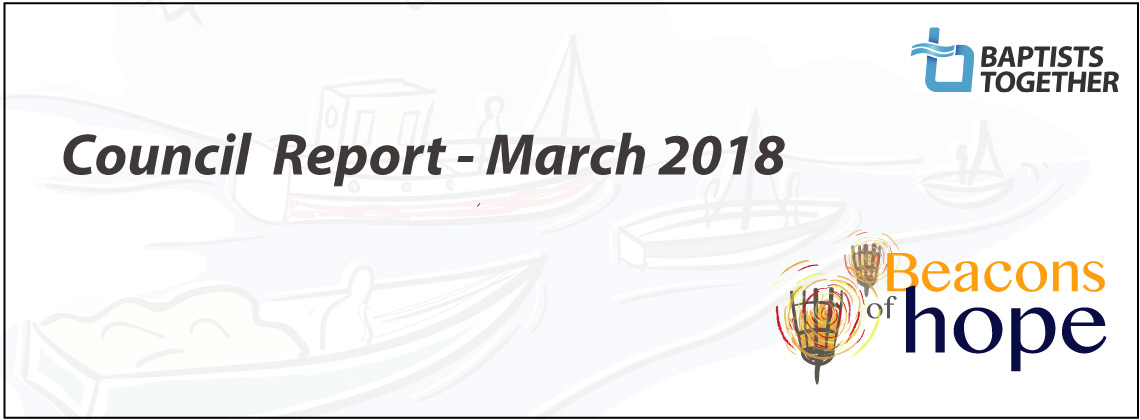
Progress on how we train, equip and encourage our future leaders was a key focus at the March 2018 Baptist Union Council. The gathering, which took place at the Hayes Conference Centre in Swanwick, Derbyshire (14-15 March), had a focus on “Investing in Godly Leaders” as updates on the implementation of the Ignite report were shared.
The role of Council is to discern the broad strategic direction of our Union, and a key chunk of time was devoted to reviewing the progress made on our 2015-2020 priorities and projects, as well as exploring what might be included in our priorities going forward.
Worship was led by Jo Williams, co-minister of Blackley Baptist Church in Yorkshire. Opening the gathering by taking 1 Corinthians 12:12-27 as her text, she said that Paul’s picture of the body not only helps us recognise our interdependence on each other, it goes further – it ‘glorifies’ in our difference.
‘1 Corinthians 12 reminds us we are all different,’ Jo said. ‘And we need to work with that difference, to celebrate the diversity. This is about unity not uniformity.’
Referring to the Council theme, she continued, ‘What does it mean to be Godly leaders? How do we encourage and invest in upcoming leaders?’
Please scroll down for the following reports:
-
Investing in Godly Leaders
-
Covenant and code
-
Vision refresh – our priorities
-
New churches welcomed
-
Key Roles Nominations
-
Charitable Incorporated Organisation progress
-
Pensions
-
RBMHS
-
Prayer
Investing in Godly Leaders
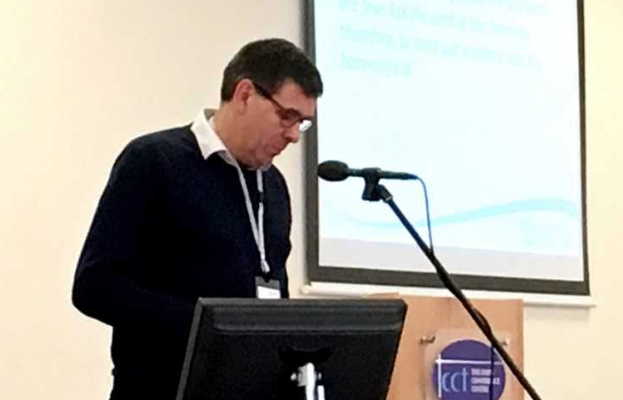 On Wednesday morning Andy Hughes, Ministries Team Leader, gave an introduction to Investing in Godly leaders, a key theme of this Council.
On Wednesday morning Andy Hughes, Ministries Team Leader, gave an introduction to Investing in Godly leaders, a key theme of this Council.
He began by quoting Matthew 9:38, saying that everything begins with God: ‘It’s ultimately the Lord’s work to raise up workers. Our job is to pray that He will be doing that, and as the Ministries Team and regional teams, to recognise and not get in the way.
'Without God raising up workers, everything else in the Ignite report is worthless. Everything begins with this premise.’
He highlighted a number of challenges our Union is facing. We are seeing ‘significantly’ more people coming up to retirement than in training. There were 29 ministerial students entering Baptist colleges last year, a figure which is normally more than 40. Is this a blip or a more general trend?
There are also still ‘far too few’ women in ministry, 100 years after the first female Baptist minister. Just 12 per cent of our fully accredited ministers are women. Although the figure is improving (33 per cent of newly accredited ministers and 37 per cent ministers-in-training are women), ‘we are still a long way from equality and need to be praying about it,’ said Andy. The aspiration is 50:50.
There are problems in supply through settlement: ministers are not moving around the country as much as previously, for a variety of reasons; new ministers are remaining in their student churches and not entering the settlement process.
Andy then gave an update on the Ignite report and how it is being implemented. The Ignite review, received in 2016, explored where ministry is going and what sort of ministers we need. It recommended a new benchmark for affirming an individual’s call to ministry that focuses more on character, than particular skills: Marks of Ministry. There are three stages to the Marks – Calling, Formation and Ongoing Development, the first two of which have now been adopted.

Andy explained that our past processes have meant we have rejected some people because they do not fit our structures. Ignite will result in both a ‘raising and lowering of the bar,’ allowing for greater flexibility in the people we can call.
‘There are places we need to raise the bar; but other places where we need to abolish the bar,’ he said. ‘The bar needs to be really high on areas like safeguarding – we need to be trust worthy, people of integrity and godliness.
‘But we need to make it more accessible to people being called.’
Other progress included changes to the register of Accredited ministers, to allow for greater flexibility in recognising people’s calling; and a move from paper files to electronic (a scanning project is almost complete). In addition, a working group has been set up to review the national settlement process.
‘The foundations have been laid,’ Andy said, ‘but there is a long way to go.’
Council moderator David Mayne noted that the Ignite implementation had taken place alongside the Historic Case Review. ‘The amount of progress made is remarkable,’ he said.
Covenant and code of practice
One of the proposals of the Ignite Report was the introduction of a Ministry Covenant as the foundation of ongoing accreditation, expressing a mutual commitment to walk together and watch over each other.
Another Ignite recommendation was the introduction of a local church ‘code of practice’, offered to all churches appointing ministers. The code is not to be a requirement, but ‘ministers would be clearly aware of the degree to which a church has engaged with and adopted the code.’ It would reflect the mutual expectations of church and minister in their ongoing covenant relationship.
John Claydon, regional minister team leader at Northern Baptist Association, and Dan Pratt, leader of 57 West, Southend and author of a book on covenant, have worked on developing these proposals. They led two sessions at Council to explain them and receive feedback. ‘It’s about relationship,’ noted Dan (pictured), 'with God and with each other.’
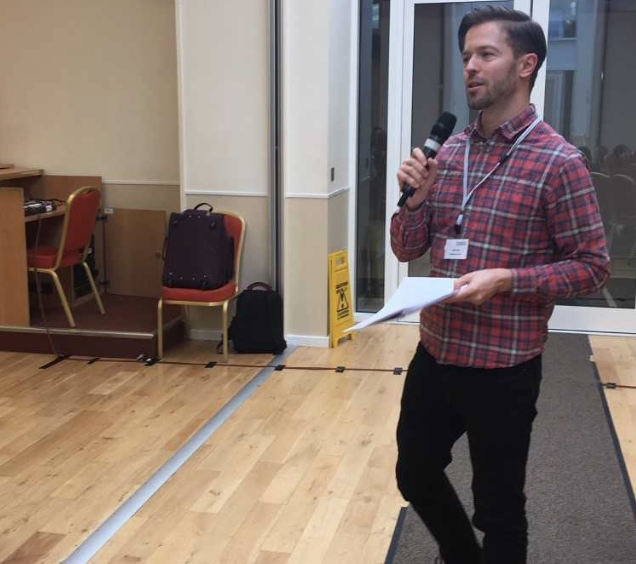
In the first covenant session, they presented their paper and encouraged council members to respond more generally. What were their initial reactions to the paper? What were their major hopes and concerns?
In the second covenant session they were invited to give feedback on the proposed covenant, and how it might be affirmed and implemented. The second session also explored the code.
Council also heard from Alan Donaldson, General Director of the Baptist Union of Scotland, which implemented ‘agreements’ for ministers a decade ago (they didn’t use the word covenant). It was born out of a desire ‘that being part of a professional body should mean something,’ he said. ‘Ministers should be bound together in a fruitful way that would bless them and others.’ After some initial reluctance, there had been a momentum shift, with only five out of 170 ministers not signing up. Every minister is required to mentor, and be mentored. There is a growing sense of ministers ‘as a guild, committed to learning the craft of ministry,’ Alan said.
There was broad welcome from Council members for both the covenant and the code, with some reservations about how the word ‘covenant’ will be understood and received.
Further work is now required to incorporate the feedback and develop the papers into documents that can be wholeheartedly endorsed.
Vision refresh – our priorities
Council members spent time reviewing the progress we have made on our 2015-2020 priorities and projects.
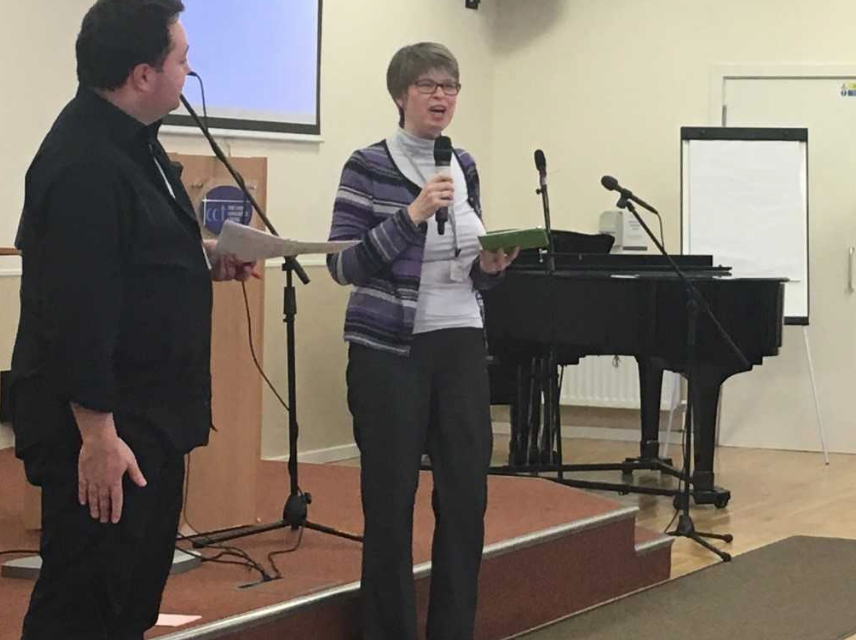 Lynn Green, introducing the session, explained that a Council gathering in 2014 had established these shared priorities. This had happened following the Futures Process, out of which our common vision “Growing healthy churches in relationship for God’s mission” had been established.
Lynn Green, introducing the session, explained that a Council gathering in 2014 had established these shared priorities. This had happened following the Futures Process, out of which our common vision “Growing healthy churches in relationship for God’s mission” had been established.
Baptists Together, she reminded Council, are the members of our Union; churches, Associations and colleges, supported by three specialist teams.
Referring to the 2015-2020 priorities, she said, ‘Today is about looking back. What has been achieved in each area? Is this still an active priority for us now?’
Members were invited to gather at tables and discuss specific areas, before providing feedback. There was a general sense that while much had been achieved, work was still needed to implement projects fully.
With regards to safeguarding, outgoing trustee Barbara Carpenter praised the progress made, but stressed that it ‘must always be an active priority.’
On communications, Stephen Keyworth, Faith and Society Team Leader, said much had been lost after the decision to close the communications department, but there had been lots achieved in terms of the development of the Baptists Together website, magazine, email channels and social media. At the same time, Associations have developed their own regional strategies, and the F&S Team has assisted training in six of them. Nevertheless, there was a ‘tremendous amount’ to go. Adrian Argile commented that a huge amount had been passed to Associations, and that more work could be done on a cohesive communications strategy across Baptists Together.
On the Loaves and Fishes Project to identify new income streams, Mike Mortimer (SCBA) had doubts over what had been achieved. He said that people give to a vision, especially a local vision. Treasurer John Levick noted that a number of its recommendations had been implemented, that the Subscriptions Working Group were currently working on possible financial models for the future which would be brought back to Council in November, and that this remained a key priority.
In terms of the health of our churches, Mark Hirst (SEBA) said we have achieved ‘a greater realism’, and from that there is a need for a ‘pioneering spirit’.
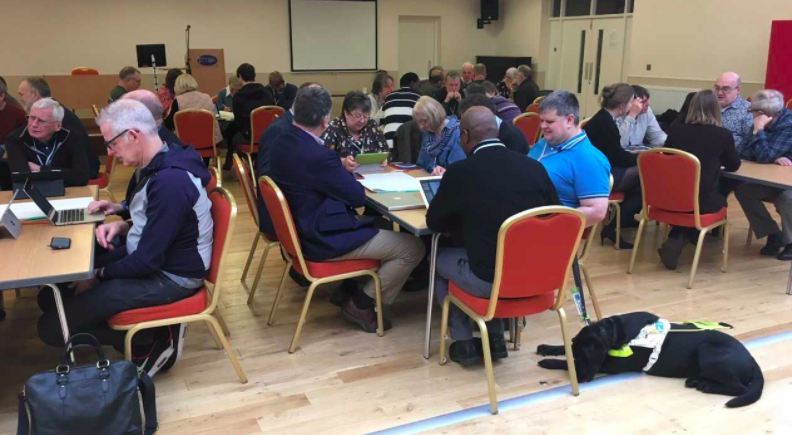
The following day council members were invited to think about what might be included in our priorities going forward. David Mayne, council moderator introduced this session. He explained that in conversations at Council and in other groups, our thinking and action has begun to coalesce around four key themes that could form the basis of our shared priorities going forward. David stressed that whilst these were shared priorities, different teams across Baptists Together would contribute to their implementation in differing ways:
They are:
-
Pioneering & Planting - investing in opportunities and pioneers.
-
Equipping the local church for mission - including CYF, millennials, transitioning churches.
-
Investing in Godly Leaders - including younger leaders, evaluating discipleship for ministers.
-
Enabling Baptist Voices in the public square - including issues of justice.
Council members were invited discuss whether these areas resonated, and whether anything was missing. There was a clear sense that all areas resonated, said Tim Fergusson, of HEBA. He commented, ‘Investing in Godly leaders is important because others will follow from that.’ Molly Boot (co-opted, 2018) highlighted Ignite’s emphasis on character, which ‘opens up possibility of raising up leaders from unexpected places’. She added pioneering is 'for all of us'.
Glen Graham, who moderates the Disability Justice Group, said that in order to be just in the public square, we need to be just in our churches. We are not there at the moment. However, work is ongoing, and he highlighted two projects the justice groups are working on at the moment. Regional Justice Hubs, and the training resource Just Aware. Several council members also emphasised the need for discipleship and it was agreed that this was relevant to each of the key themes.
One group suggested there should be an extra theme: one that emphasises building a sense of connectedness as Baptists, and encouraging and reclaiming a sense of Baptist identity, and Council considered together whether this was a key theme rather than a given of our dna and culture values. A couple of members suggested that a sense of identity and belonging would flow out of doing the other four areas well. It was therefore decided that a sentence emphasising the sense of connectedness would provide the context for each of the four points.
Our current priorities and priorities (2015-2020) are:
-
Our vision for Baptists Together is clearly embraced and understood and our renewed culture has become the norm.
-
We have established structures for relating that reflect our governance report and enable relationships of trust to flourish and mission to be enabled as easily as possible.
-
We have a clear grasp of the health of our churches and a clear understanding of what needs to be done to enable mission across Baptists Together.
-
To have implemented the Ministries Project recommendations.
-
To navigate well the issues of human sexuality and find a settled place.
-
To implement the Loaves and Fishes project to identify new income streams.
-
To ensure that a strategy is developed and implemented to stabilise the Pension Schemes.
-
To complete and implement the review of our Safeguarding.
-
To develop the database to incorporate the needs of Associations and our Union as a whole.
-
To develop a communications strategy.
New churches
Three new churches which have joined our Union were affirmed by Council. These were: God is Faithful Church, Salford (NWBA), All Nations for Christ, Romford (EBA), and The King’s Church, Addlestone (SEBA). This was the first item on the agenda, and Stephen Keyworth, Faith and Society Team Leader, said, ‘Recognising churches that have joined us is a good place to start. We are expressions of God’s people, seeking to make Jesus known where we are.’
Council was also notified that one church – Hammersmith Christian Fellowship – has chosen to cease membership with our Union, yet will continue their membership with the Old Baptist Union.
Key Roles Nominations Team
Rupert Lazar gave a report of the Key Roles Nominations Team. A successor to outgoing BUGB Trustees moderator Rich Webb has yet to be identified. Of those who had had expressed an interest or been approached, some had felt it wasn’t the right time for them, often due to workload, Rupert said. The team was in conversation with possible candidates. Rich’s term ends in August.
Rupert brought the names of two new trustees: Philip Lutterodt, currently pastor of Mitcham Baptist Church in London and a former member of the Ghana Baptist Convention, and Philip McCormack, principal of Spurgeon’s College. Both were elected. Council also approved the Trustees’ nomination that John Levick continues as treasurer of our Union. The nomination will now be taken to Assembly.
Rupert also shared that David Mayne has agreed to do a second term as moderator of Council, and this was unanimously affirmed by Council.
We prayed for and expressed our thanks to outgoing trustees Barbara Carpenter and Joe Kapolyo, along with Rich Webb, who will finish his term as Moderator of the Trustee Board in August. Furthermore, John Grant (LBA) and Philippe Ndabananiye (EMBA), were both attending their last Council and were thanked for their contributions (pictured). New council members including Molly Boot, Gemma Dunning, Mark Hirst and Hayley Young were welcomed.
Rupert thanked Council members who had put forward these and other recommendations. ‘You have responded to our call for giving names of appropriate people to serve. We still want more, but thank you for those who have, we are encouraged by that,’ he said. ‘What we do is an important piece of work that demands a lot of prayer, because we are looking for strategic people to serve in our family.’
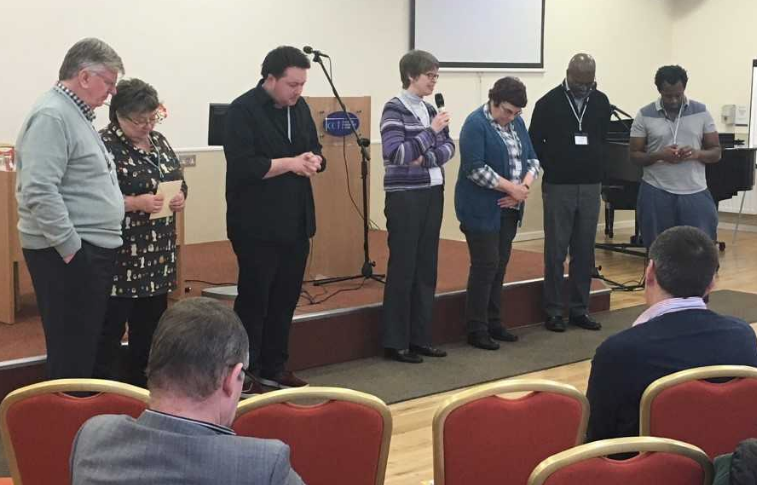
Charitable Incorporated Organisation
The next phase of the Baptist Union of Great Britain becoming a Charitable Incorporated Organisation (CIO) took place. BUGB is currently an unincorporated charity. At March Council 2017 members voted unanimously to accept the Trustees recommendation that BUGB incorporates as a CIO.
At the last Council (November 2017) members approved a draft constitution for the new CIO.
Since then there has been a consultation period for BUGB members to consider the draft constitution, which resulted in some revisions. This revised draft was approved by the BUGB Trustees on 20 February 2018 and was subsequently approved by Council. It will be put to the Assembly on 12 May 2018.
‘It’s something that’s clearly us, clearly Baptist, but better understood by the Charity Commission,’ explained moderator of Trustees Rich Webb.
Council also approved a number of resolutions that will be put to Assembly. The resolutions relate to the changes which need to be made to the current BUGB Constitution to provide for the transfer of the assets, liabilities and activities to the new CIO. These were also approved.
Rich explained that members of the Assembly will be asked to vote on the resolutions in the main programme. There will also be a session before Assembly starts for those wanting to know more about the CIO process.
All documents relating to BUGB becoming a CIO can be found here: baptist.org.uk/cioconsult
Pensions
Treasurer John Levick and Support Services Team Leader Richard Wilson gave an update on the pension situation. The deficit on the pension scheme peaked in August 2015 at £140m. As Council began that figure stood at £107m, John said.
A series of proposals,known as the “Family Solution”, to substantially reduce the deficit have now been agreed by the Pension Trustee. The plan meets the stated objective of a 10-year recovery plan with no increase in contributions from churches.
There is now some work to do to finalise the plan before it is submitted to the Pension Regulator for approval ahead of the end of March deadline.
‘There is an element of relief,’ said John. ‘There have been extremely tough negotiations, but we now have an agreement about how we move forward.’
Richard added, ‘Pensions has been an issue that’s loomed over the whole denomination for some time.
‘We now have a plan that gives a chance put this behind us in a realistic time frame.’
It is hoped that the details of the agreed plan will be communicated to employers, beneficiaries and other stakeholders in April.
RBMHS
The November gathering saw Council members approve a change of constitution of the Retired Baptist Ministers Housing Society to a CIO, to mirror BUGB becoming a CIO. The change is subject to an application to the Charity Commission. ‘We are still uncertain about timescale, but there has been real progress,’ explained RBMHS chair Bill Johnston.
The RBMHS annual report – its 43rd – was shared with Council, covering the period up to September 2017. It had been another good year for the society, which had provided housing to all applicants who meet the criteria and continue its ‘unblemished record.’ While its finances were in good shape at the moment, Bill noted that the value of legacies received was at the lowest level for some time.
Prayer
Once again Council invited our Union to pray together with a prayer event live streamed on Facebook. Joe Kapolyo, Glen Graham, together with Dianne Tidball and Lynn Green led us in prayer for renewal, young adults in our churches and communities, personal holiness and renewal and leadership. Around 25 churches joined live and there have been 2,500 views of the video. Catch up with the prayer meeting here:
After sharing Paul’s image of the body to open Council, Jo Williams led communion (pictured). She brought Psalm 123:2 to the gathering on Thursday morning.
As the eyes of the servant, watch the hands of the mistress, so our eyes look for favour from you, oh God.
‘The Psalmist is encouraging us to have that attentiveness; to catch God’s will, heart and favour,' Jo said. 'Let’s take a moment to be still and focus on God.’
As Council ended she said, ‘It’s been humbling but reassuring to watch you wrestle with those issues and listen to each other. I want to thank you for serving our Union in this way.’
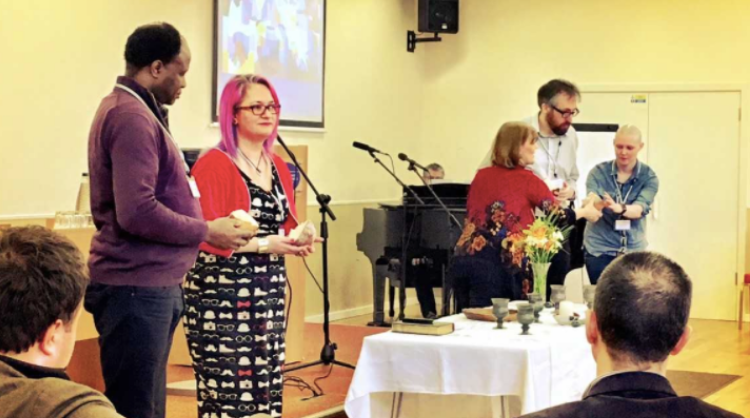
Baptist Times, 20/03/2018